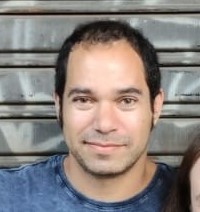
Márcio Vilar
studied Social Sciences at the Federal University of Paraíba (UFPB) and obtained his master’s degree from the Graduate Program in Sociology and Anthropology (PPGSA) at the Federal University of Rio de Janeiro (UFRJ). After having completed his doctorate at the Institute of Anthropology at the University of Leipzig, he became a research associate in the Anthropology Department of the University of Sussex. Supported by the German Research Foundation (DFG), he works as a Postdoctoral Researcher at the Institute of Sociology at the Goethe University Frankfurt. His research focuses on the mutual impacts between innovative biotechnologies for autoimmune diseases, new communication technologies and society, medicine and law in Brazil.
Publications
Core Publications
Vilar, M. (2020). Calon-Welten: Eine Ethnografie über das Leben, Sterben und Weiterleben bei Ciganos in Brasilien. Reihe Kultur und Soziale Praxis. Bielefeld: transcript Verlag.
Vilar, M. (2018). ‘To uninstall oneself’: Ethnographizing Immunostimulant Drugs for Autoimmunity in Brazil. In Garnett, E., Reynolds, J., & Milton, S. (eds.), Ethnographies and health: reflections on empirical and methodological entanglements. London: Palgrave Macmillan, 213–232.
Vilar, M. (2018). Moving between ‘chronic diseases’ and ‘secret cures’: bionetworking asco-production of medico-legal order and regenerative medicine for autoimmunity in Brazil. Curare – Journal of Medical Anthropology, Special Issue on Healing Cooperation, 41 (1+2), 17–37.
Most recent
Vilar, M. (Forthcoming). Feeling Out of the Box: Unmaking Chronicity and Co-Producing Medical Evidence through Life Assemblages in Brazil. In Schubert, C. and Voss, E. (eds.), Ambivalences of Healing Cooperations: Curing with and without Consensus. New York: Springer.
Vilar, M. (Forthcoming). Transfiguration. In George, P. and Greenberg, Y. (eds.), The Handbook of Religion and the Body. London: Routledge.
Vilar, M. (2020). Following ‘Fosfo’: Synthetic Phosphoethanolamine and the Transfiguration of Immunopolitics in Brazil. Medicine Anthropology Theory. Special issue on ‘Rethinking sociality and health: transfigurations of bodies, practices, and policies in an interconnected world’. Obrist, B., Mattes, D., & Hadolt, B. (eds.), 7(1): 87–116.
Go to all publications [Link zu allen Publikationen: https://humangeographie.academia.edu/M%C3%A1rcioVilar]
Research
Contested legitimacy of regenerative vs. established biomedicine in Brazil: On the circulation and co-regulation of immunostimulant therapies for autoimmunity (1 May 2019 – 30 April 2022, Research Grant n. 419940268, German Research Foundation, DFG)
How does the development of a new therapeutic model, whose potential emergence threatens the hegemony of an already established biomedical model, affect, and how is it affected by law, science and society? To anchor this question in a particular context, I am conducting an anthropological study into how scientific innovation, established biomedicine and informal health care co-exist and interface in contemporary Brazil, and how their relations are mediated by legal institutions and other actors. In order to do this, I delineate and explore ‘life assemblages’ related and interconnected through the use of ‘immunostimulant drugs’ for the treatment of autoimmune diseases, which are conventionally treated with ‘immunosuppressant drugs’ worldwide.
My central case study is the ‘anti-brucellic vaccine’ (VAB) – a drug that was produced in Brazil and largely used by patients against several autoimmune diseases. After more than 10 years seeking to become authorized by medico-legal authorities, the VAB remained an object of controversy and was recently taken as the basis for the development of a further biotechnological innovation called Complex of Essential Amino Acids (CAE), which is currently being reviewed in clinical tests. CAE is currently available as a ‘manipulated/experimental drug’ while the clinical tests are being run in parallel.
Inspired by Actor-Network Theory, I follow VAB/CAE in order to re-trace associations and map the main relations that have constituted it as a biotechnological innovative agent and, simultaneously, as an object of judicial dispute and regulation. I compare VAB/CAE case to other cases of circulation and regulation of immunostimulant drugs as contested innovations in Brazil, such as synthetic phosphoethanolamine. By doing this, I weave an ethnography of the VAB/CAE out of a multi-sited ethnographic fieldwork through participant observation (including autoethnography) and, complementarily, digital methods and documentary research.
It seems that, from an international perspective, the VAB/CAE case reveals how research into the production, circulation and regulation of immunostimulant therapies for autoimmune diseases in Brazil can provide critical insights into the emergence of regenerative medicine as a transnational process. Moreover, whilst shedding light on legal conflicts between established regulatory science and challenging innovative biotechnologies, the VAB/CAE case highlights how the renewal of established biomedicine for autoimmunity partially unfolds by means of informal pharmaceutical economies, other cultures of legality and their respective moralities.
(https://gepris.dfg.de/gepris/projekt/419940268?language=de)